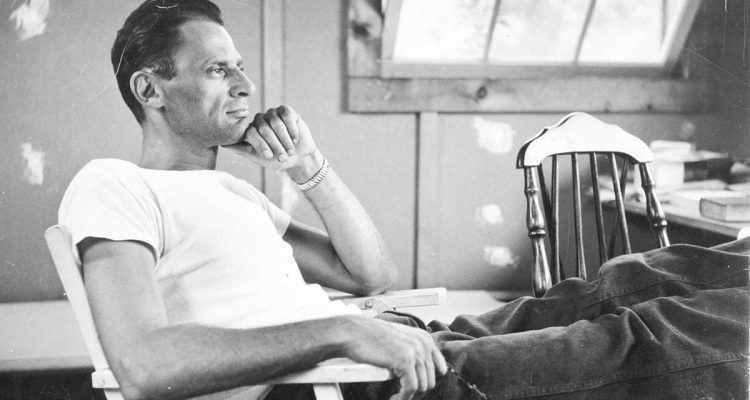Few if any artists can equal the run of successes that Arthur Miller enjoyed on the New York stage from the end of World War II to the mid-fifties that included “All My Sons,” “Death of a Salesman,” “The Crucible,” and “A View from the Bridge.” Those plays, among the best ever written in America, are intertwined with that era, both bringing Miller immense success at the time and serving as guides to future generations hoping to understand that time and its values. Yet, artist’s reputations are fickle things, subject to unfair forces beyond the quality of the art, and by the end of the 1950s, Miller was more famous for his tumultuous marriage to Marilyn Monroe and his run-in with the reactionary House Un-American Activities Committee. Though Miller kept writing and producing plays for the rest of his long life, which ended in 2005, he was so connected to his post-war moment that later generations of artists and critics almost had to react against him to prove their contemporary bona fides. But in the new millennium, the power of Miller’s work has returned him to the top of the pantheon of American theater.
Now, Miller’s reputation has the great fortune to be in the hands of his talented daughter Rebecca Miller, an accomplished filmmaker (“Maggie’s Plan,” “The Ballad of Jack and Rose”) who crafts a thought-provoking study of her father in “Arthur Miller: Writer.” The documentary benefits from the best of both worlds as she brings a professional’s touch to the montage and pacing of the film while drawing from over 25 years of interviews with her subject and his family.
With the help of Arthur’s siblings Kermit and Joan, Miller paints an evocative portrait of her father’s childhood. His mother was cultured and somewhat stifled in her family role, his father was an uneducated immigrant who had sailed over on his own at age seven; the family enjoyed success throughout the 1920s only to lose it all in the Great Crash. This tangible turning point and the bitterness it engendered in his parent’s marriage planted the seed of business success (or lack of it) transmuting into familial strife that later bloomed into “Death of a Salesman.” As the second son, Arthur escaped being pressed into the family business and instead attended the University of Michigan, where he made his first attempts at playwriting and met his first wife.
As the film progresses into Arthur’s era of great success, Rebecca is able to draw from vintage photos, video, and Arthur’s own words from his autobiography “Timebends: A Life.” She wisely restricts the non-family talking heads to two theater luminaries, Tony Kushner and Mike Nichols, whose insights should be welcome in any film, and they are more than capable of analyzing Miller’s plays and putting them in their proper cultural context. The family interviews are candid and without rancor as she portrays the dissolution of his marriage to Mary Slattery, the mother of his first two children (both are interviewed in the film) who is portrayed as an intelligent partner to Arthur who was left behind as he achieved fame and met Marilyn Monroe.
While “Arthur Miller: Writer” doesn’t dwell too long on the tabloid frenzy of his second marriage, it does investigate the dynamic of trying and failing to save someone that defined both the marriage and his theatrical attempt to make sense of it, “After the Fall.” The film shifts to a happier, pastoral mood as Miller marries his third wife, Rebecca’s mother Inge Morath, an indomitable German who survived horrors at the end of the war as a teen, and went on to become a successful photographer. The two lived happily for decades in rural Connecticut where Arthur got up everyday to write (the family marvels at his “blue-collar” work habits) and also enjoyed walks through the forest, and woodworking.
If there is a flaw in the film, it’s that even with her privileged vantage point, Rebecca Miller overly focuses on the already well-known aspects of her father’s life. While it’s natural to give attention to the 1950s classics, she only lightly alludes to the critical diminishment of his last three decades of work, simply commiserating with her father about cruel critics instead of presenting analysis and letting the audience come to its own conclusions.
Another unseen but felt presence is that of Rebecca’s younger brother Daniel, who was born in 1966 with Down syndrome. The Millers followed the medical advice of the time and had him immediately institutionalized, only rarely seeing him and essentially erasing him from the family’s public history (he is unmentioned in “Timebends”). Arthur has come under fire in recent years for this treatment (though it was common at the time) and had personal regrets about it as well. Rebecca Miller shares that she wanted deeply to ask her father about this on camera, but it was so painful she was never able to before Arthur’s death. She further shares that while Daniel did not want to be in the movie, he is now leading a happy and independent life.
“Arthur Miller: Writer” does not radically reappraise Miller’s life or work, but the personal details will make it intriguing for long time fans and it can serve as an excellent introduction for a younger generation. Miller’s genius was to marry the public and private, to take the universal currents that were coursing through the American subconscious after the war and integrate them into painfully intimate family conflicts. Now his daughter Rebecca’s documentary is the best chance yet to see his public and private lives side by side. [B+]
Follow along with all our New York Film Festival coverage here.

